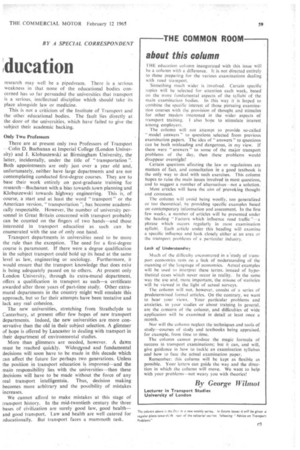THE COMMON ROOM about this column
Page 61

If you've noticed an error in this article please click here to report it so we can fix it.
THE education column inaugurated with this issue will be a column with a difference. It is not directed entirely to those preparing for the various examinations dealing with road transport.
Something much wider is involved. Certain specific topics will be selected for attention each week, based on the more fundamental aspects of the syllabi of the main examination bodies. In this way it is hoped to combine the specific interest of those pursuing examination courses with the provision of thought and stimulus for other readers interested in the wider aspects of transport training. I also hope to stimulate interest among employers. "
The column will not attempt to provide so-called " model answers" to questions selected from previous examination papers. The idea of " answers" to questions can be both misleading and dangerous, in my view. If there were "answers" to some of the major transport problems of the day, then these problems would disappear overnight!
Certain questions affecting the law or regulations are matters of fact, and consultation in a good textbook is the only way to deal with such exercises. This column hopes to raise the main issues involved in most questions, and to suggest A number of alternatives—not a solution. Most at:ticles will have the aim of provoking thought. and comment.
The column will avoid being woolly, too generalized or too theoretical, by providing specific examples based on contemporary information and assessment. In the first few weeks, a number of articles will be presented under the heading Factors which influence road traffic "—a phrase which occurs regularly in most examination syllabi. Each article under this heading will examine a specific influence and look closely either at an area, or the transport problems of a particular industry.
Lack of Understandinl
Much of the difficulty encountered in a'study of transport economics rests on a lack of understanding of the meaning of the lam-wage of economics. Actual examples will he used to interpret these terms, instead of hypothetical eases which never occur in reality. In the same way the use and, more important, the misuse of statistics will be viewed in the light of actual surveys. .
The column will not, however, consist .of a series of predetermined formal articles. On the contrary, we want to hear your views. Your particular problems and anxieties, in your studies or about training in general, are the concern of the column, and difficulties of wide application will he examined in detail at least once a month,
Nor will the column neglect the techniques and tools of study—courses of study and textbooks being appraised, for example, from time to time.
The column cannot produce the magic formula of success in transport examinations; but it can, and will, give guidance in how to tackle an examination syllabus and how to face the actual examination paper.
Remember: this column will be kept as flexible as possible. Your letters can guide the way and the direction in which the column will move. We want to help with your problems--not weary you with theories!
By George Wilmot
Lecturer in Transport Studies University of London






























































































































